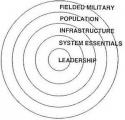I wanted to pick up an idea I tossed out in another thread and elevate it to it's own. I've kind of been playing with it for a few years.
Here's the gist: one of the foundation assumptions of current American strategy is that most people around the world like us hence we can and should work through local partners to win "hearts and minds." We realize there are "evil" people who don't like us but we figure we can counter them with strategic communications or information operations, and by "empowering moderates" (largely defined as people who ARE favorably inclined towards us). This may simply be a false assumption.
I'm moving toward the conclusion that our problem is NOT that people don't understand us (and hence the problem is NOT poor strategic communications or information operations). Most people do have a reasonably good understanding of us. They just increasingly don't want what we want and plain don't like what we stand for.
These two alternative assumptions suggest very different overarching strategies. The first suggests our current strategy--empower moderates, use strategic communications and information operations, strengthen local partners and win hearts and minds. The second would certainly take friends where they exist, but not try to pretend that they exist everywhere. Instead it would basically say, "You don't want to be our friend, fine. But if you generate projectable power that might be used against us or our friends, we're going to drop out of the sky, bust it up, then leave. Many times across many decades if necessary. If you, on your volition, change your mind and want to be our friend, give us a call."













Bookmarks